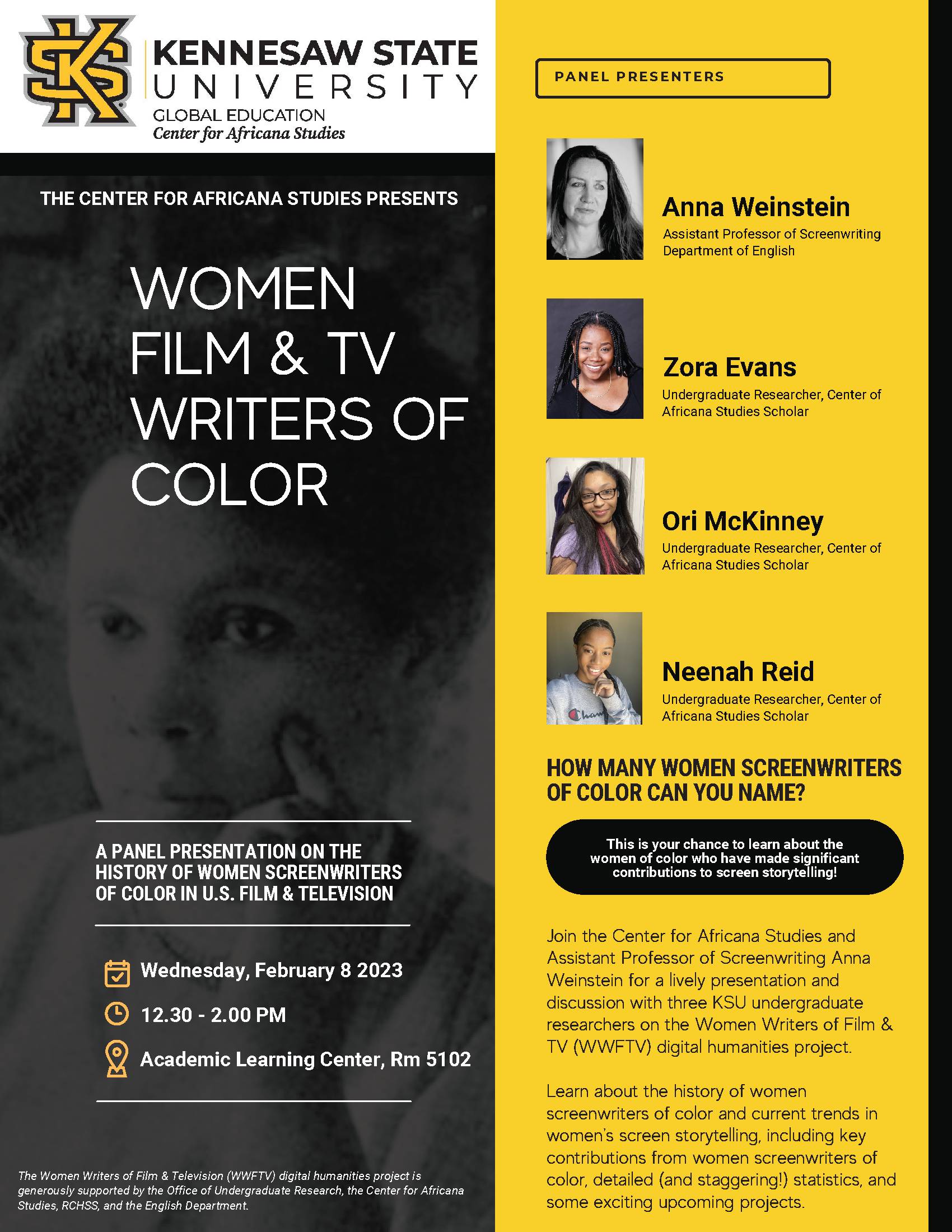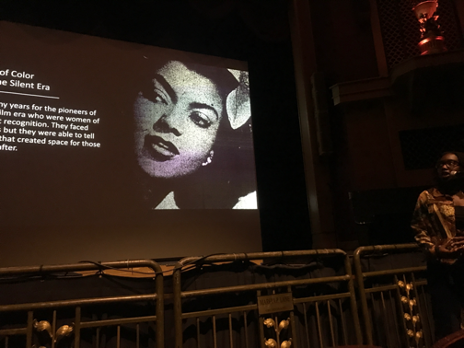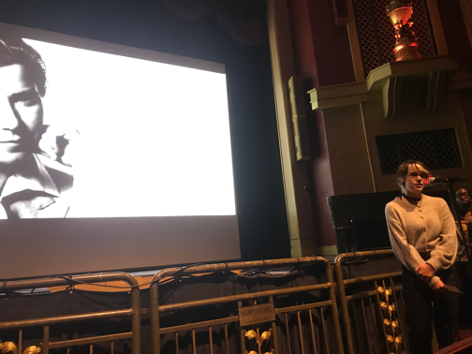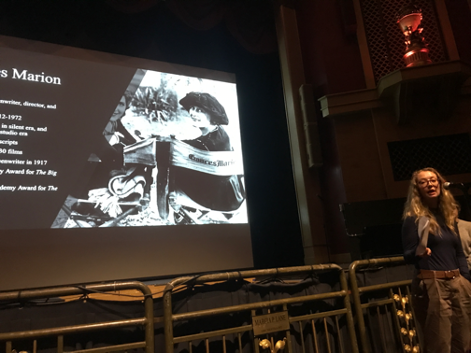Women Screenwriters Project

Underway since Fall 2020, the Women Writers of Film & Television (WWFTV) digital humanities project will culminate in a searchable online database of feature films, made-for-television movies, television mini-series, and television shows and episodes created or written by women. This digital publication will serve as a much-needed scholarly resource for those studying the history of women writers of film and television.
Student scholars are researching critically acclaimed, commercially successful, and forgotten films and television programs written by women, compiling data and short biographies about the women writers who contributed to these screen stories. Students' research includes women screenwriters of color, global women screenwriters, and women screenwriters whose work was influential, well-received, or in some way intriguing in retrospect but whose names may or may not be commonplace to those who create, consume, or analyze film and television.
My goal with this study is threefold:
- To offer inspiration to women screenwriters and other underrepresented screen storytellers;
- To provide searchable data about contemporary and historical women writers of film and television and the stories they created for the screen;
- To highlight particularly interesting and little-talked-about women screenwriters and their films or series (e.g., emmy-winning and Oscar-nominated screenwriter Eleanor Perry; Emmy-winning creator of The Golden Girls, Susan Harris; Oscar-winning co-writer of Big, Anne Spielberg).
Student researchers work independently and under faculty supervision, obtaining critical research, writing, and presentation skills.
This digital humanities project is generously supported by KSU's Office of Undergraduate
Research, Graduate College, and Center for Africana Studies (CAS), as well as the
Jewish Federation of Greater Atlanta.
-
Student Learning Outcomes
Participating students learn how to:
- Conduct scholarly research using print publications and online archives and databases.
- Compile data in an organized, easily accessible format.
- Critically analyze films and television shows (and their screenplays).
- Review previous research and synthesize findings.
- Summarize research findings in written and oral presentations.
-
Student Scholars
2020/21
- Gabrielle Jones, First-Year Scholar
2021/22
- Abiodun Akinleye, First-Year Scholar
- Isabel Alford, First-Year Scholar
- Zora Evans, Center for Africana Studies (CAS) Scholar
- Hannah Henderson, First-Year Scholar
- Haley Hunt, Summer Research Scholar
- Gabrielle Jones, Sophomore Scholar
- Autumn Jordan, Center for Africana Studies (CAS) Scholar
- Taylor McKinney, Center for Africana Studies (CAS) Scholar
- Alexis Newman, First-Year Scholar
- Neenah Reid, Center for Africana Studies (CAS) Scholar
- Carolina Solis, Graduate Research Assistant
- Rayna Stallings, First-Year Scholar
2022/23
- Isabel Alford, Sophomore Scholar
- Nyla Allen, First-Year Scholar
- Montes, Montes de Oca, First-Year Scholar
- Jane Ramirez, First-Year Scholar
- Kikelomo Sanni, Honors Research Assistant (Fall 2022)
- MaKayla Tappin, Graduate Research Assistant
2023/24
- Olivia Smith, URCA Scholar (Spring 2024)
- Gabrielle Jones, First-Year Scholar
-
Projected Timeline
Soft Launch: Summer 2022
- To gather feedback from colleagues in screenwriting, film studies, and women's studies
Hard Launch: Summer 2024
-
Academic Conference Presentations
Southeastern Women's Studies Association (SEWSA)
March 2022 (virtual)"Who Gets Credit? Contemporary & Historical Women Writers of Film and Television"
Two panels led by KSU student scholarsWho can we credit for the recent influx of streaming films and television series with exciting and complicated female protagonists? Certainly we applaud the writers penning these stories, but to give credit where it's due, we must find and celebrate the women writers who were crafting screen stories with rich and complex female characters during the earliest and most exclusive periods of the industry. Most of these trailblazing women are only recently being discussed in serious conversations and critical publications about film and television history, and some of these women’s names have not appeared on screen or in print in 100+ years.
These two panels on women film and television writers will offer an overview and engaging discussion of key works by six women film writers and six women TV writers, including early scenario writers from the silent and studio eras; early television writers who got their start in radio; writers working during the 1950s and 1960s, as well as during and immediately following second-wave feminism; writers who were a part of the 1990s independent film scene and television boom; and writers who have led the explosive growth of women working in the 21st century. Though women’s work as writers in film and television has grown significantly in the past few decades, there remains a significant gender gap in Hollywood’s employment practices.
These panel discussions will address current statistics for women writers working in film and television, key writers and their screen stories, early women screenwriting teachers and "gurus," as well as significant historical moments that shifted the cultural landscape in the U.S., enabling more women writers to share their voices in screen storytelling.-
Panel I: Women Feature Film Writers
- Isabel Alford
- Zora Evans
- Hannah Henderson
- Ori McKinney
- Alexis Newman
- Anna Weinstein
-
Panel II: Women Television Writers
- Abby Akinleye
- Gabrielle Jones
- Autumn Jordan
- Neenah Reid
- Carolina Solis
- Rayna Stallings
Posters at the Georgia Capitol & National Conference on Undergraduate Research (NCUR)
March & April 2022 (Atlanta, GA)"LGBTQ Children’s Television Creator, Chris Nee: One Woman’s Efforts to Diversify Characters on the Small Screen"
Poster and oral presentations by Gabrielle Jones (KSU Sophomore Scholar)
A 2008 study published in the Future of Children journal (Princeton University) found that the type of media content children watch affects their well-being and social-emotional development. In 2019, the Geena Davis Institute on Gender in Media announced the historic achievement that female leads and co-leads had “reached gender parity in top children’s television programming,” including the “25 top Nielsen-rated children’s television programs watched by kids ages 2-13" and the “100 most popular children’s films rated G, PG, and PG-13." Through my work on Professor Anna Weinstein’s Women Writers of Film & Television research project in the English Department at Kennesaw State University, I have identified a female children’s television creator who is leading the charge to create programming that intentionally integrates diversity and more accurately represents a cross-selection of children and their experiences. In this presentation, I examine the work of female LGBTQ television writer and showrunner Chris Nee, who created series such as Doc McStuffins 2012-2020) and Ridley Jones (2021--). Doc McStuffins was the first children’s program to feature an African American female lead. Nee’s collaboration with Barack and Michelle Obama led to her award-winning animated short, We the People (2021). Her most recent efforts to bring diverse voices to the small screen is the forthcoming series Spirit Rangers, created by Karissa Valencia, which Nee is producing through her company Laughing Wild. Nee and Valencia have committed to staffing the show with an entirely Native American writers room. This presentation will explore Nee’s work to create new voices for children’s television programming, diversifying the characters onscreen as well as the writers developing these characters behind the scenes.
Popular Culture Association (PCA)
April 2022 (Seattle, WA -- moved to virtual)"Jewish Women Screenwriters: Kvellers, Kvetchers, and the Golden Art of Spieling"
Paper presentation by A. Weinstein
Screenwriting Research Network (SRN)
September 2022 (Vienna, Austria)"The Women Writers of Film & Television Digital Humanities Project: Curated Research & Soft Launch"
Presentation by A. WeinsteinThis paper will detail my research underway since Fall 2020, excavating the names and work of women film and television writers frequently left out of conversations about U.S. screenwriters of significance. This research is funded by two generous grants from my university, including the Center for Africana Studies and the Office of Research, which have offered support from ten undergraduate student scholars and one graduate research assistant. The resulting scholarship will be a website called Women Writers of Film and Television, which will allow users to input search criteria and find film and television programs written by women. The soft launch is projected for summer 2022, and the hard launch for summer 2023. With this paper presentation, I will share short biographies of some of the most intriguing women writers whose names have to date been lost in the archives, and I will reveal the website design, features, and plans for the public launch, as well as any complicating factors, questions, and technical difficulties in bringing this website to fruition. For the soft launch, the content will be entirely women screenwriters from the U.S; however, my goal with this site is to continue adding content to include women screenwriters from around the globe. Though there has been an increased focus on women film and television directors in the past five years, there remains little public discussion of women screenwriters and even fewer resources available to support those interested in this area of contemporary industry studies and film and television history. As of now, there is no available resource where users can input keywords and search for screen stories written by women. With this paper presentation, I welcome the opportunity to solicit feedback from my international screenwriting colleagues so that I may implement changes before the hard launch the following year.
National Conference on Undergraduate Research (NCUR)
April 2023 (Eau Claire, Wisconsin)"Pre-Code Versus Contemporary Female Screenwriters: Working Towards More Authentic Depictions of Women on Screen"
Presentation by Isabel Alford (KSU Sophomore Scholar)Even in the 21st century, movies have remained an integral part of American pop culture, and while methods of consumption have changed, millions of Americans still flock to theaters every year. So why is it that, even in 2022, Americans are not proportionally represented in film? In today’s world, there is a lack of adequate representation of women in film. While there may be more characters who are women than there were in the past, the depictions of women are not always the most accurate. The solution to this ever-present issue in the industry is hiring more women as directors, executive producers, producers, and/or writers, as this increases the likelihood of films portraying women more authentically. Although there were few in number, pre-Code female screenwriters such as Lorna Moon and Dorothy Howell wrote films with daring and realistic depictions of women during a time that was characterized by male dominance. This change from the status quo for female characters sent a ripple through the film industry that can be seen even in films today. Contemporary screenwriters such as Phoebe Waller-Bridge and Diablo Cody carry on the legacies of both Moon and Howell in that they too write more authentic female characters and challenge how society views women today. Although the stories in contemporary films may be different than pre-Code films, the women written by these female screenwriters are very similar and act as lifelines for young girls who are used to seeing the same stereotypical woman in every film they see. Although film has evolved greatly over time, unfortunately, the industry still struggles with its representations of women. However, it’s screenwriters like Waller-Bridge and Cody who are trying to change this and are working upon the foundations the pre-Code female screenwriters built in the early Hollywood era.
-
-
Recognition & Awards
Spring 2021
Selected as 2nd Runner Up, KSU's Symposium of Student Scholars
Featured Story, KSU's The Investigator Research Magazine
Student Scholar: Gabrielle Jones, MENT MajorSpring 2022
Sophomore Scholar Selected for The College Tour Show (Amazon Prime)
Student Scholar: Gabrielle Jones, MENT MajorSummer 2022
Selected for KSU's Competitive 2022 Summer Undergraduate Research Program
Student Scholar: Haley Hunt, English MajorSpring 2023
Selected as Outstanding Student for BA in English, RCHSS Awards
Student Scholar: Haley Hunt, English Major
Additional Student Presentations
February 2023
Academic Learning Center, KSU
Undergraduate students Zora Evans, Neenah Reid, and Taylor (Ori) McKinney presented on women screenwriters of color (sponsored by the Center for Africana Studies).

September 2022
Silent Film Festival, The Strand Theatre, Marietta, GA
Undergraduate students Kikelomo Sanni, Isabel Alford, and Haley Hunt presented on women screenwriters from the Silent Era.

Kikelomo Sanni

Haley Hunt

Isabel Alford









